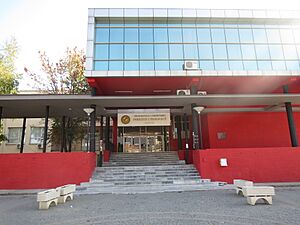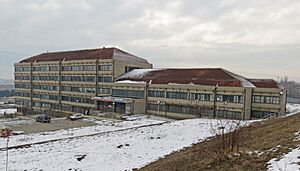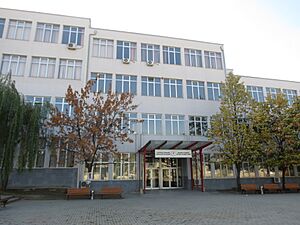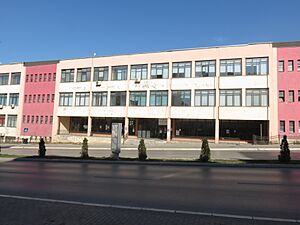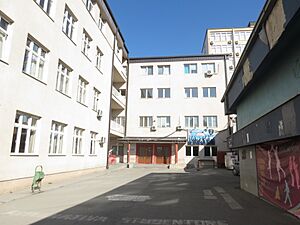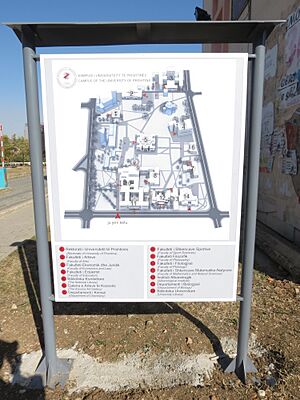University of Pristina facts for kids
|
Universiteti i Prishtinës
|
|
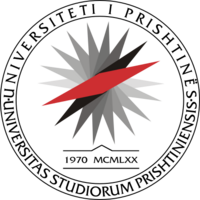
Seal of University of Pristina
|
|
| Latin: Universitas Studiorum Prishtiniensis | |
| Type | Public |
|---|---|
| Established | 18 November 1969 (officially) 2 August 1999 (current form) |
| Budget | €34.0 million |
| Rector | Arben Hajrullahu |
|
Academic staff
|
1,284 |
| Students | 23,351 (2024–25) |
| Location |
,
42°39′31″N 21°09′42″E / 42.658687°N 21.161649°E |
| Campus | Urban |
| Colours | |
| Affiliations | Erasmus |
| University rankings | |
|---|---|
| Regional – Overall | |
| QS Emerging Europe and Central Asia | 351-400 (2022) |
The University of Pristina (in Albanian: Universiteti i Prishtinës) is a public university in Pristina, the capital city of Kosovo. It is the main university in the country and an important center for learning for Albanian-speaking students.
The university was created after the Kosovo War and took the place of an older university that existed from 1969 to 1999. Its opening was a major event for the people of Kosovo. The university's official day is February 15th. When it first started in its new form, it had faculties for philosophy, law, economics, engineering, and medicine. Today, it has grown to include 17 faculties. The university's emblem includes its name in Latin, Universitas Studiorum Prishtiniensis.
Contents
What is the University of Pristina?
The University of Pristina is the largest and most important university in Kosovo. It is a member of the European University Association and works with universities in Europe and the United States. It is also the highest-ranked university in Europe where classes are taught in the Albanian language.
The university is a public institution, which means it is funded by the government. It has its main campus in the city of Pristina but also has branches in other towns like Gjilan, Peja, and Prizren. It offers many types of degrees, including bachelor's, master's, and doctorate (PhD) degrees in various subjects.
Students and Organization
The school year at the University of Pristina starts on October 1 and ends on September 30. It is split into two semesters.
Education has always been very important in Kosovo. By 1980, about one in every three people in the region was a student in a school or at the university. The number of students grew very quickly. In the 2016-2017 school year, there were almost 39,000 students. Most of them were from Kosovo.
Each year, about 5,000 students earn a bachelor's degree, and about 1,000 earn a master's degree. Since it was founded, over 70,000 students have graduated from the university.
Unlike many other universities in Europe, each faculty at the University of Pristina operates somewhat independently. This means each one has its own management and structure.
History of the University
The original University of Pristina was founded in 1969. At that time, Kosovo was part of a country called Yugoslavia. Classes were taught in both Albanian and Serbo-Croatian. Because of this language division, it was often seen as two separate institutions in one.
The founding of the university was a big step for the Albanian community in Kosovo. However, the university's history was affected by political problems and conflicts in the region.
The 1981 Student Protests
In 1981, the university became the center of student protests in Kosovo. The protests started with students asking for better food and living conditions in their dorms. These small protests grew into large demonstrations across the region.
Changes in the 1990s
During the 1990s, there were many political changes. Many Albanian teachers were dismissed from the university. In response, the Albanian community set up a "parallel" education system. They held classes in private homes and other buildings so that Albanian students could continue their education. About 30,000 students were educated this way.
After the Kosovo War
The Kosovo War in 1999 caused major disruptions. After the war, the university was re-established as the institution it is today, serving mainly the Albanian-speaking community in Pristina. The Serbian-language part of the old university moved to North Mitrovica, where it continues to operate as part of Serbia's education system.
In recent years, the university has faced challenges. In 2014, students held protests that led to the resignation of the university's rector, Ibrahim Gashi, after disagreements over academic publications.
How the University is Run
The University of Pristina is managed by two main groups: the Steering Council and the Senate. The Steering Council is in charge of the university's overall strategy and makes sure it runs well. The Senate is the highest academic group and is led by the rector.
The rector is the main leader of the university. He or she is responsible for the daily operations and academic leadership. The rector is helped by vice-rectors and a secretary-general.
The Central Administration handles all the professional and technical work of the university. This includes student admissions, staff management, finances, and maintaining the university's buildings and records.
Faculties and Departments
The university is made up of different academic units called faculties. Each faculty focuses on a specific area of study.
- Faculty of Philosophy
- Faculty of Mathematics and Natural Sciences
- Faculty of Philology
- Faculty of Law
- Faculty of Economics
- Faculty of Civil Engineering
- Faculty of Electrical and Computer Engineering
- Faculty of Mechanical Engineering
- Faculty of Medicine
- Faculty of Arts
- Faculty of Agriculture and Veterinary
- Faculty of Sport Sciences
- Faculty of Education
- Faculty of Architecture
Life on Campus
The university campus is located in a great spot in Pristina. It is used by students and also by other people from the city for different activities.
The National Library
The National Library of Kosovo is on the university campus. It is the most important library in the country. Its mission is to collect and protect important documents for the nation. The library is famous for its unique architecture, which some people find beautiful and others find unusual.
Student Housing
The campus has eight student dormitories, also known as halls of residence. They offer an affordable place for students to live. The monthly fee also includes meals at the student canteen.
Special Programs
Pristina International Summer University
Since 2001, the university has hosted the Pristina International Summer University (PISU). This program brings together students and professors from Kosovo and other countries for two weeks every summer.
Students can take special courses and earn credits. The program also includes public talks and fun events. The goal of PISU is to build connections between the University of Pristina and other universities around the world.
Career Development Center
The Career Development Center helps students prepare for their future jobs. It offers advice on finding work, gaining experience, and developing new skills. The center also provides a Virtual Career Platform, where students can connect with companies and organizations online to find job opportunities.
Notable People
Many famous people have studied or taught at the University of Pristina. They have become leaders in politics, science, and the arts.
- Fehmi Agani - A professor and politician.
- Atifete Jahjaga - The former president of Kosovo.
- Albin Kurti - The current prime minister of Kosovo.
- Vjosa Osmani - The current president of Kosovo.
- Ibrahim Rugova - The first president of post-war Kosovo.
- Hashim Thaçi - A former president and prime minister of Kosovo.
- Fatmir Sejdiu - A former president of Kosovo.
See also
 In Spanish: Universidad de Pristina para niños
In Spanish: Universidad de Pristina para niños
- List of split up universities
 | Roy Wilkins |
 | John Lewis |
 | Linda Carol Brown |


